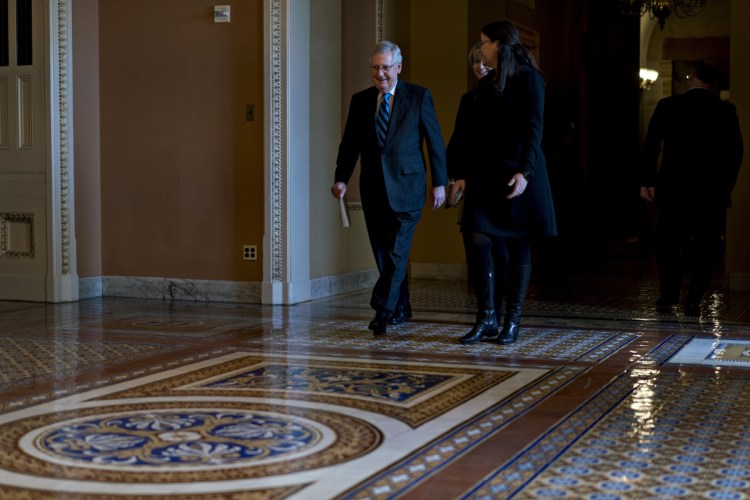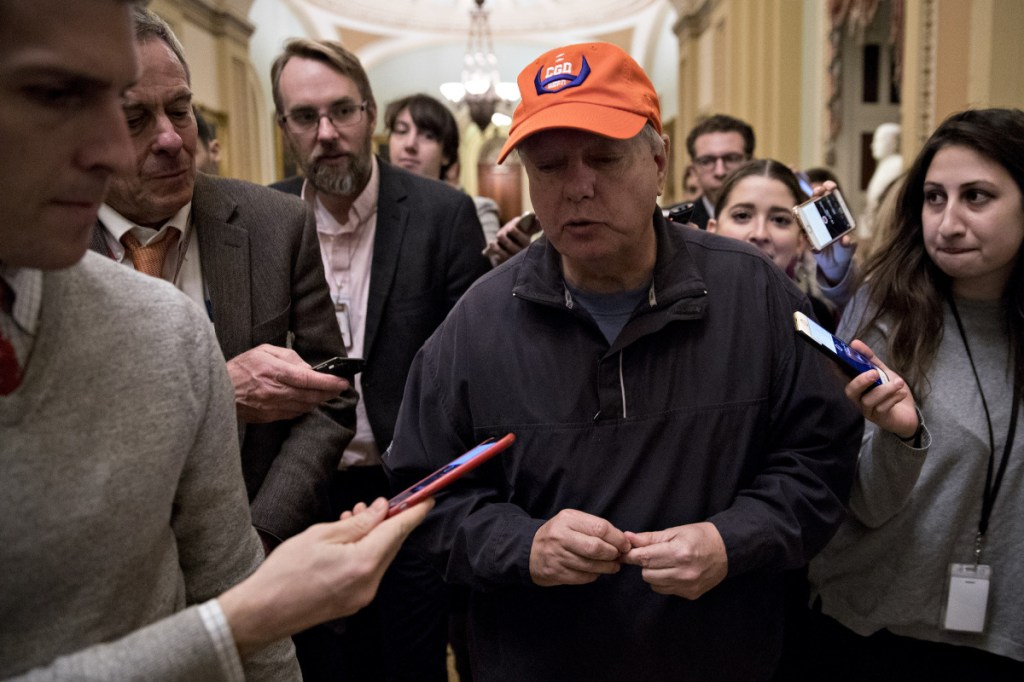WASHINGTON — The government shutdown headed into its third day after frantic efforts Sunday by a bipartisan group of moderate senators failed to produce a compromise on immigration and spending.
“We have yet to reach an agreement on a path forward that would be acceptable for both sides,” Senate Minority Leader Charles E. Schumer (D-N.Y.) said shortly after 9 p.m. Sunday, adding that talks would continue ahead of a procedural vote scheduled for noon Monday.
The effects of the shutdown over the weekend were relatively limited — halting trash pickup on National Park Service property, canceling military reservists’ drill plans, and switching off some government employees’ cellphones.
But the shutdown continuing into Monday, the start of the workweek, means that hundreds of thousands of workers will stay home and key federal agencies will be affected. Passport and visa applications will go unprocessed, federal contractors will see payments delayed, and the Internal Revenue Service will slow its preparations for the coming tax season.
The moderates’ proposal – to link a three-week extension of government funding to the consideration of an immigration bill in the Senate – prompted Senate Majority Leader Mitch McConnell (R-Ky.) to announce that he would be willing to start debating immigration legislation if an agreement of the issue was not otherwise reached by early February.”Let’s step back from the brink,” he said. “Let’s stop victimizing the American people and get back to work on their behalf.”
But the pledge came with caveats that led senior Democratic aides to question whether it would ultimately be workable. Mindful of the failure of a sweeping immigration bill that passed the Senate in 2013 but languished in the House, Democrats want stronger assurances that the legislation they are demanding to protect young undocumented immigrants will ultimately become law.
Whether Republicans can find compromise on immigration remained as uncertain as ever Sunday, with no clear backing from House Republican leaders or President Trump, who showed no sign of retreating from his hard line on immigration.
Still, Senate Majority Whip John Cornyn (R-Texas) said he was “optimistic” the Senate would vote tomorrow to break the impasse. Schumer, he said, “wants to just give everybody a chance to chew on it and sort of understand it, and so that’s why he didn’t want to have the vote tonight.”
Matt House, a spokesman for Schumer, said the Democrats “made some reasonable offers to Senator McConnell and he hasn’t accepted them yet. The caucus is waiting for him to move some in our direction.”
The bipartisan group scrambled for a compromise, but the decision ultimately belonged to McConnell and Schumer.
“We’re trying to be helpful in showing them that there is a path forward,” said Sen. Susan Collins (R-Maine), who hosted more than a dozen fellow moderates in her office for an early afternoon meeting.
Sunday began with more of the partisan posturing that marked much of the previous week, delivered on the morning news programs, on the House and Senate floors, and in a presidential tweet.
Trump wrote that if the “stalemate continues,” then Republicans should use the “Nuclear Option” to rewrite Senate rules and try to pass a long-term spending bill with a simple majority rather than the 60 votes needed to pass most legislation — a notion Trump has previously floated to McConnell’s repeated dismissal.
The president otherwise remained uncharacteristically quiet, heeding the advice of senior advisers who argued that he has the upper hand over Schumer and the Democrats and that they would soon be forced to capitulate.
On the Senate floor, Schumer showed no signs of caving and kept pressure on Republicans.
“Not only do they not consult us, but they can’t even get on the same page with their own president,” he said. “The congressional leaders tell me to negotiate with President Trump; President Trump tells me to figure it out with the congressional leaders. This political Catch-22, never seen before, has driven our government to dysfunction.”
As the clock ticked toward a scheduled 1 a.m. Monday vote — set by McConnell in part because of arcane Senate rules but later postponed — the moderates made the most visible progress toward a deal. Among the participants in the Collins meeting were a number of Democrats who are seeking reelection in states Trump won in 2016 — five of whom voted Friday against sparking the shutdown in the first place.
“There are more than just moderate Democrats or conservative Democrats — a majority of Democrats want it to end,” said Sen. Joe Manchin III (D-W.Va.).
All of that weighed on lawmakers who milled around the Capitol, many in flannel shirts, sweater vests and other casual garb.
“If it doesn’t happen tonight, it’s going to get a lot harder tomorrow,” said a windbreaker-and-baseball-cap clad Sen. Lindsey O. Graham (R-S.C.), who has pressed for action on immigration legislation and met with the moderates’ group Sunday.
No firm proposal emerged from the meeting, but senators discussed a broad outline that could unlock a deal: modify the temporary spending bill now under consideration in the Senate to expire on Feb. 8, and then find some way to guarantee that immigration legislation moves forward in the interim.
The White House has said it supports the plan for funding through Feb. 8 but has been wary of making concessions on immigration. While legislation protecting DACA recipients could probably move through the Senate with Democrats and a handful of Republicans supporting it, Trump has rejected proposals along those lines and House GOP leaders are under fierce pressure not to bring up any bill that a majority of Republicans would reject.
Speaking on ABC’s “This Week,” White House legislative affairs director Marc Short declined to provide assurances that the president would guarantee a vote on an immigration bill in exchange for a short-term spending deal. “We want to have the right resolution,” he said.
Other Republicans also saw little advantage in making any concessions to advance legislation that would provide protections for “dreamers” — undocumented immigrants brought illegally to the United States as children, 690,000 of whom face potential deportation after Trump canceled the Deferred Action for Childhood Arrivals program.
In a brief closed-door meeting of House Republicans, House Majority Leader Kevin McCarthy (R-Calif.) reassured lawmakers that there would be no negotiations on the issue as long as the government remained shuttered, affirming the White House position.
Cornyn told reporters that the deadline for action to address DACA remained March 5, when the last of the program’s participants will see their protected status expire.
“We’re more than happy to have a vote on it well before the deadline. We’ve committed to that,” Cornyn said. “But turning the agenda over to Democrats who just shut down the government makes no sense to me. It just seems like it encourages bad behavior.”
While there have been talks since early last year about trading DACA protections for more border security funding, as many Republicans want, negotiations have failed to produce a deal.
Democrats said they made a significant concession over the weekend, agreeing to put major funding behind Trump’s promised border wall, something that has been anathema to liberals since the 2016 presidential election.
Schumer on Sunday said that in a Friday meeting, Trump “picked a number for the wall, and I accepted it.”
“It would be hard to imagine a much more reasonable compromise,” he added. “All along, the president saying, ‘Well, I’ll do DACA, dreamers, in return for the wall.’ He’s got it. He can’t take yes for an answer. That’s why we’re here.”
Rep. Luis V. Gutiérrez (D-Ill.), one of the most outspoken Democratic advocates for immigrant rights, also said in a Sunday appearance on ABC’s “This Week” that he would agree to the funding.
“I think the wall is a monumental waste of taxpayer money,” he said. “Having said that . . . if that’s what the hostage takers [demand for] the dreamers, if that’s their ransom call, I say pay it.”
But the concession was rejected on two fronts. Doubts remained that the Democratic rank and file would agree to wall funding — even with the blessing of Schumer and Gutiérrez. Asked about a deal that could deliver Trump as much as $20 billion for the border wall, House Minority Leader Nancy Pelosi (D-Calif.) scoffed, “Oh, come on.”
“None of us is at a table where they’re talking about $20 billion,” she said. “Should there be fencing? Should there be technology? Should they mow the grass so that people can’t hide in it? Should there be some bricks and mortar someplace? Let’s see what works.”
And Republicans themselves scoffed at Schumer’s claim that he offered Trump precisely what was demanded. The Democratic offer, they said, fell short of the full, immediate funding the president sought and instead involved yearly installments of funding that could be subject to future shutdown threats.
Moreover, Republicans have demanded concessions on other aspects of the immigration system, including an end to rules authorizing permanent legal immigrants to sponsor family members for legal status and an end to a “diversity visa” program that distributes visas based on a lottery system.
The wall is “one of the three legs of this three-legged stool,” said Rep. Mark Meadows (R-N.C.), a key House conservative. “I’m glad to hear that there is some movement there, but there’s a couple of other legs of that stool that have to be put forth.”
The battle lines over immigration have become especially firm as spending talks falter. Republican leaders have cast the shutdown as the product of Democrats’ prioritization of undocumented immigrants over American citizens.
But a debate has opened up in the party about how far to push that argument. House Speaker Paul D. Ryan (R-Wis.) questioned an online ad from Trump’s campaign that said the president’s immigration proposals are “right” and “Democrats who stand in our way will be complicit in every murder committed by illegal immigrants.”
“I don’t know if that’s necessarily productive,” Ryan said on CBS.
Most senators remained cautious about the developments, adding quickly after each burst of optimism that any vote late Sunday or early Monday could easily fall apart and that the moderate group was sparking discussion but was hardly in control.
Sen. Joe Donnelly (Ind.), one of the five Democrats who crossed over on Friday, said he and other Democrats met with Schumer on Sunday morning.
“The pitch is we need to do what’s right for the country and he does, too. He feels the same way, and that’s what we’re trying to do,” said Donnelly, who faces a tough reelection fight in a state Trump won.
Send questions/comments to the editors.



